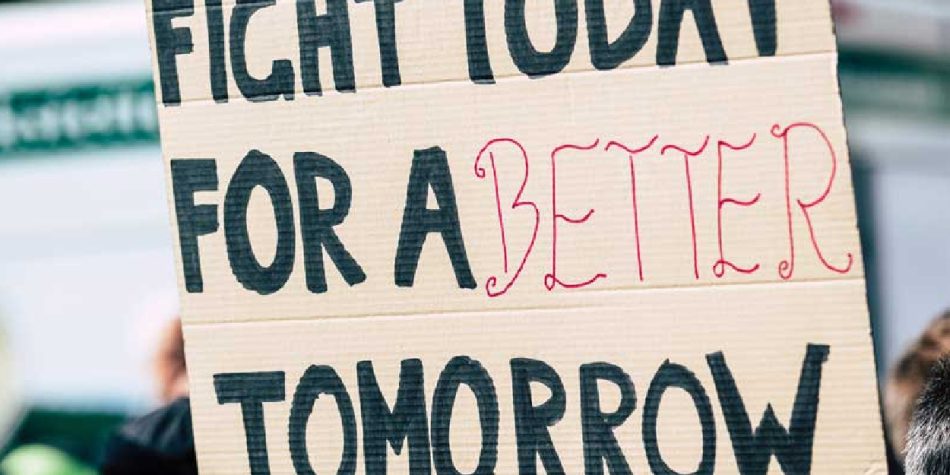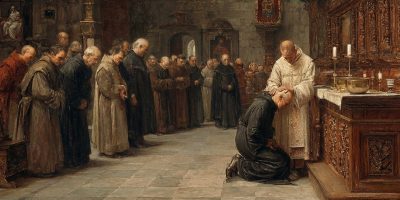A chasm has erupted among Latter-day Saint circles. The culprit? Social justice. The divide runs along political lines and often breeds more estrangement and division. The more liberal side of this debate often champions social justice efforts boldly, while sometimes advancing ideas that traditional believers resist. On the other hand, the more conservative side repeatedly criticizes social justice ideology as presently constituted without often pausing to consider a social justice effort more consistent with their own convictions.
Too often, we conflate policies with values, and thereby reject the values we hold because we have attached them too strongly to policy. For example, some reject the immorality of aborting a child, due to resistance to specific policy efforts on the right. In the other direction, wholly rejecting anything related to equal justice, due to certain policy efforts on the left is another illustration. By contrast, I find myself imagining a social justice not so quickly rejected, but instead reflecting an extension of Latter-day Saint values, which includes a plurality of political views. By self-consciously operating from a Latter-day Saint framework, we can creatively reimagine social justice in an inclusive and expansive way without shoehorning political positions into principles; presently, though, it does seem like an all-or-nothing debate.
In the midst of this all-or-nothing debate, Public Square editors put out an article last fall entitled Does Social Justice Really Have to Divide Us? where they asked, “What if we got a little more curious about how we might legitimately embrace certain elements of social justice without ‘wresting’ the scriptures and deforming the teachings of Christ in any way?”
I became curious about this possibility: What could it really mean to articulate a social justice ideology that comports with Latter-day Saint teachings and beliefs? My journey in preparing this piece led me to connect deeply with the words of then-Elder Oaks at a Latter-day Saint Student Association Fireside back in May of 1986: “I find some wisdom in liberalism, some wisdom in conservatism, and much truth in intellectualism—but find no salvation in any of them.”
Instead of exploring how our unique Latter-day Saint identity can influence social justice, many have heavily, and hastily condemned all related activism to the point where we inadvertently forsake Christ’s teachings around ministering to the poor, needy, hungry, sick, and afflicted. All Christians agree on the importance of reaching out to the vulnerable.
Here, I will not directly criticize social justice ideology, but instead attempt to make my own contribution towards articulating a broader, more positive form of it, grounded in Latter-day Saint scripture and teachings. Rather than attempting to stretch our teaching beyond recognition and extrapolate far beyond core doctrines of our faith, I’m intrigued at the extent to which some of the core doctrines of the restoration provide a potential foundation on which common ground on social justice-related issues might be found.
I summarize six possible underpinnings below:
1. Priority concern and service for the vulnerable. It’s clear, especially from the New Testament, that Christ expects us to take steps in our own spheres towards a more just society. In the Lord’s powerful parable of the sheep and the goats, we read, “Then shall the King say unto them on his right hand, Come, ye blessed of my Father, inherit the kingdom prepared for you from the foundation of the world: For I was an hungered, and ye gave me meat: I was thirsty, and ye gave me drink: I was a stranger, and ye took me in: Naked, and ye clothed me: I was sick, and ye visited me: I was in prison and ye came unto me.”
All Christians agree on the importance of reaching out to the vulnerable. Indeed, Jesus goes on to note that it’s precisely on this point that He will ultimately separate out the nations and judge them from one another. But how exactly to go about this?
While our commitment to social welfare and justice should not be in dispute, we definitely need caution when exploring the methods used to pursue that aim. As Latter-day Saints, the most obvious way we pursue this is through meaningful service, as well as collective efforts through tithes and offerings that fill the bishop’s storehouse, and provide funds to be shared with the needy among us—and in other nations.
These are not secondary matters for us. As Amulek warns, “if ye turn away the needy, and the naked, and visit not the sick and afflicted, and impart of your substance, if ye have, to those who stand in need—I say unto you, if ye do not any of these things, behold, your prayer is vain and availeth you nothing, and ye are as hypocrites who do deny the faith.”
We have a scriptural mandate to move towards a time when there is “no poor among [us],” even if it means real personal sacrifice. Elder Holland recounts a story of President Monson, who had given away his second suit, his shirts, and even the shoes off his feet while he visited East Germany.
Latter-day Saints seek to minister to families around us and find ways to give of our time, talents, and resources in other ways. Tutoring those seeking to learn more, or donating more to charity—all this reflects ways to contribute to social justice on an individual level. “Today, the Church disavows the theories advanced in the past that black skin is a sign of divine disfavour or curse, or that it reflects unrighteous actions in a premortal life; that mixed-race marriages are a sin; or that blacks or people of any other race or ethnicity are inferior in any way to anyone else. Church leaders today unequivocally condemn all racism, past and present in any form.”
2. Support that builds greater capacity in those who are vulnerable. Food, clothing, and medical care are a starting point, but the substance God calls us to share with others must go beyond that—with an aim to build spiritual and emotional capacity in recipients. In a message where he also spoke of not turning away the needy, hungry, sick, or afflicted, Elder Jeffrey Holland reassured his audience, “now, lest I be accused of proposing quixotic global social programs or of endorsing panhandling as a growth industry, I reassure you that my reverence for principles of industry, thrift, self-reliance, and ambition is as strong as that of any man or woman alive.”
That doesn’t mean telling people to “buck up.” While people are receiving an education, applying for jobs, or receiving medical care, they do still often need ongoing help before they get back on their feet.
3. Taking seriously the need to abandon prejudice and hatred of any kind. President Nelson has taught: “The Creator calls on all to abandon attitudes of prejudice against any group of God’s children. Any of us who has prejudice toward another race needs to repent.” He has also asked the saints “to lead out in abandoning attitudes and actions of prejudice.”
Consistently, updated historical writing states: “Today, the Church disavows the theories advanced in the past that black skin is a sign of divine disfavour or curse, or that it reflects unrighteous actions in a premortal life; that mixed-race marriages are a sin; or that blacks or people of any other race or ethnicity are inferior in any way to anyone else. Church leaders today unequivocally condemn all racism, past and present in any form.”
Other types of prejudice condemned by the Church include sexism and nationalism, all of which betray our core conviction that “all are alike unto God.”
The Church is very serious about these efforts, issuing strong condemnations of white supremacy and adding the goal of eradicating racism to the handbook. President Oaks specifically reminded us that racism includes “the police brutality and other systemic discrimination and housing publicized recently.” That encourages us to step outside our comfort zones and explore broader definitions of racism—considering ways that racism has been perpetuated through the historic wealth gap, redlining, etc., so that we can address systemic inequality.
Rooting out these attitudes involves gaining exposure to those of different races and building bridges because we tend to hate that which we do not understand. In addition to appreciating racial dynamics in Latter-day Saint history more deeply, we can study the inspiring examples of faithful Black Latter-day Saints in our history, as well as reading works by Black Latter-day Saints now. As we listen and learn more, we can allow for grace, understanding, and repentance as we fall short and experience discomfort for past mistakes.
Yet this can be motivation for looking forward and making changes. By opposing all forms of hatred, we become more like our Savior Jesus Christ. And in all this, we can be united in seeing the restored gospel of Jesus Christ as providing the best impetus and ideas for alleviating those evils.
4. Advocating for protecting all life, including the most vulnerable. The Church’s position on abortion is that except in cases of rape, incest, or health, abortion is contrary to the will of God, but that those circumstances do not automatically justify an abortion. Similar to allowing birth control, while encouraging a couple to not delay having children within a marriage, abortion is never encouraged and has been “consistently opposed” by the Church.
While some have attempted to construe a pro-choice position from Church teaching, President Oaks has clarified: “My young brothers and sisters, in today’s world we are not true to our teachings if we are merely pro-choice. We must stand up for the right choice.”
The idea that pro-choice policies produce fewer abortions has been challenged by a left-wing fact-checker recently. That is not to say that Democratic policies generally cannot lower abortion rates because certainly, they can, but this fact-check applies specifically to pro-choice policies. And Terryl Givens has written: “At a minimum, Saints should deplore the current amoral regime in which even the most minimal appeals to humanity have been obliterated in the name of “reproductive freedom.”
The eradication of abortion comes both through seeking it to be abolished and finding ways to make it less necessary. That means looking beyond only the act of abortion alone to the broader dynamics that lead women in that direction. For instance, since abortion disproportionally impacts women of color and women of lower socioeconomic status, it could rightfully be considered an example of systemic discrimination.
Advocating life goes beyond abortion as well. The protection of life should be womb to tomb. The Church’s position on capital punishment is, “we neither promote nor oppose capital punishment.” Patrick Mason’s case against capital punishment provides a scriptural imperative to oppose it. Research shows that around 4% of inmates were killed despite their innocence, an issue disproportionately impacting Black people as well. Given the high rates of incarceration and negative outcomes for those released, perhaps it’s also time to follow the lead of Joseph Smith, who suggested prisons be reformed with “reason and friendship.”
5. Welcoming strangers, refugees, and immigrants. Another issue that we must speak about is related to the family as well and it is refugees. The Church developed an initiative called “I Was a Stranger” in order to encourage members to find ways to involve themselves with bringing refugees into the community and integrating them. This provides a great model for helping refugees and immigrants alike adjust to American life while actively working to understand the cultural customs and practices that they are accustomed to having. Since we believe in strong families, we also do oppose the separation of families at the border as made clear with multiple statements. We need to ensure that immigrants are able to safely enter the country, remain with their families, and integrate into society in a way that makes them feel loved and welcome.
While our imperative to accept refugees and immigrants with open arms is a scriptural one, we are still counseled to make informed choices about laws around the border. The Church has encouraged legislation that “will properly balance love for neighbors, family cohesion, and the observance of just and enforceable laws.” Walker Wright has argued for underrecognized benefits of “welcoming migrants with open arms and advocating for far less restrictive immigration policies.” Latter-day Saints should absolutely support safe immigration and streamlining this process as a way to show our neighbors that we will willingly accept them, while still maintaining border security.
6. Raising our voices to advocate for truth and love. Testimony encompasses a wide range of activities that might be defined as witnessing that Jesus is the Christ. Channeling Joseph Smith, one could argue that sharing the gospel of Jesus Christ through testimony is an act of social justice because it empowers individuals to align themselves with the law of love more.
I find that Latter-day Saint critiques of social justice often err on the side of self-reliance in a way that does not encapsulate the Lord’s commandment to “feed my sheep.” In the pursuit of becoming like Jesus Christ, we become love personified, like He is and was love personified. If love becomes part of our persons, we see that all commandments, laws, and righteous activities from giving to the poor to reading scriptures to education prepare us for and help us fulfill the law of love, thereby contributing to our social justice efforts.
That love will be important to explore differences that remain. Elder Uchtdorf reminded us that, “the gospel of Jesus Christ transcends politics, prejudices, and personal grudges.” As we develop an explicitly Latter-day Saint social justice ethic, we can allow ourselves grace and forgiveness as we do our best to relieve the burdens of the marginalized and seek to carry out Christ’s work.
By articulating a Latter-day Saints social justice ethic through values rather than through policies, we can perhaps better establish unity as Latter-day Saints as we confront social issues. Instead of allowing political opinions to divide us, my hope is that we can link arms together and collaborate based on our perception of common problems in our society. Whether Democrat or Republican or a third party, we can unite over our shared values and creatively work together to create a more just society.
This piece does not come close to being a comprehensive approach to social justice on every issue, but that can be a shared project of exploring ways to follow the example of the Savior Jesus Christ, whose calling is to “preach good tidings unto the meek … to bind up the brokenhearted, to proclaim liberty to the captives, and the opening of the prison to them that are bound.”
We have covenanted to follow Him in this work. Whether that is eradicating stereotypes etched deep in our minds, or trading our Netflix for volunteering the community, let’s do it! If taken seriously, this will raise all of us out of our comfort zones and require our commitment, but this commitment is an extension of our covenants, not anything apart from it.

















